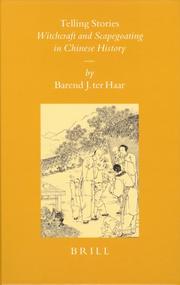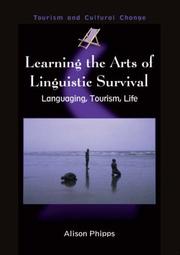| Listing 1 - 4 of 4 |
Sort by
|

ISBN: 9004148442 9047417232 Year: 2006 Publisher: Leiden Brill
Abstract | Keywords | Export | Availability | Bookmark
 Loading...
Loading...Choose an application
- Reference Manager
- EndNote
- RefWorks (Direct export to RefWorks)
S13A/0403 --- S13A/0402 --- S13A/0450 --- S11/0607 --- S02/0310 --- S16/0195 --- China: Religion--Rites, magic, festivals --- China: Religion--Mythology (incl. pantheon, ghosts, myths and legends) --- China: Religion--Astrology, fortune-telling, physiognomy, occultism, numerology, divination --- China: Social sciences--Symbols --- China: General works--Intercultural dialogue --- China: Literature and theatrical art--Thematic studies --- Legends --- Oral communication --- Rumor --- History. --- Rumour --- Propaganda --- Public opinion --- Publicity --- Oral transmission --- Speech communication --- Verbal communication --- Communication --- Folk tales --- Traditions --- Urban legends --- Folklore --- History

ISBN: 9780521819442 9780521126953 052181944X Year: 2006 Publisher: Cambridge [etc.] Cambridge University Press
Abstract | Keywords | Export | Availability | Bookmark
 Loading...
Loading...Choose an application
- Reference Manager
- EndNote
- RefWorks (Direct export to RefWorks)
In the seventeenth and eighteenth centuries China, Japan and the Spice Islands dazzled the English imagination as insatiable markets for European goods, and as vast, inexhaustible storehouses of spices and luxury wares. Robert Markley explores the significance of attitudes to the wealth and power of East Asia in rethinking conceptions of national and personal identity in seventeenth- and early eighteenth-century English literature. Alongside works by canonical English authors, this study examines the writings of Jesuit missionaries, Dutch merchants, and English and continental geographers, who directly contended with the challenges that China and Japan posed to visions of western cultural and technological superiority. Questioning conventional Eurocentric histories, Markley examines the ways in which the writings of Milton, Dryden, Defoe and Swift deal with the complexities of a world in which England was marginalized and which, until 1800, was dominated - economically at least - by the empires of the Far East.
S02/0300 --- S02/0310 --- China: General works--Chinese culture and the West and vice-versa --- China: General works--Intercultural dialogue --- English literature --- J4129 --- History and criticism --- Japan: Sociology and anthropology -- cross-cultural contacts, contrasts and globalization --- East Asia --- Great Britain --- Asia, East --- Asia, Eastern --- East (Far East) --- Eastern Asia --- Far East --- Orient --- Civilization. --- In literature. --- Civilization --- East Asian influences. --- Comparative literature --- anno 1600-1699 --- anno 1500-1599 --- History and criticism.

ISBN: 1845410548 9781845410544 9781845410537 184541053X 9781845410551 1845410556 128070537X 9786610705375 1845413334 Year: 2006 Publisher: Bristol, UK Blue Ridge Summit, PA
Abstract | Keywords | Export | Availability | Bookmark
 Loading...
Loading...Choose an application
- Reference Manager
- EndNote
- RefWorks (Direct export to RefWorks)
In this ground-breaking contribution to the study of tourism and languages, Alison Phipps examines what happens when tourists learn to speak other languages. From ordering a coffee to following directions she argues for a new perception of the relationship between tourism and languages from one based on the acquisition of basic, functional skills to one which sustains and even strengthens intercultural dialogue. The twelve chapters comprising this book tell stories of the experience of learning and speaking tourist languages. Drawing on a range of disciplines Alison Phipps takes the reader on a journey through risk, way finding, mistakes, laughter, conversations and the imagination. She provides rich descriptions of the world of language learning which has remained invisible to mainstream studies of language education, existing as it does on the margins of educational life. She shows how tourism is shaped by the learning experiences of everyday life. Languages, she argues passionately, fundamentally change the nature of perception, dwelling and relationships to other people and the world. This book will be essential reading for all those interested in tourism studies and in modern languages education. It is a timely study, coming at time of crisis in languages, as English exerts its power as a world language and as a dominant language of tourism. Learning the Arts of Linguistic Survival: Languaging, Tourism, Life will also be of interest to anthropologists, linguists, geographers, sociologists and those studying education.
Intercultural communication. --- Second language acquisition. --- Sociolinguistics. --- Tourism. --- Tourists. --- Language and languages --- Tourism --- Languages & Literatures --- Philology & Linguistics --- Study and teaching --- Taalgebruik in het toerisme --- Toerisme --- discoursanalyse --- Study and teaching. --- Taalgebruik in het toerisme. --- discoursanalyse. --- Holiday industry --- Operators, Tour (Industry) --- Tour operators (Industry) --- Tourism industry --- Tourism operators (Industry) --- Tourist industry --- Tourist trade --- Tourist traffic --- Travel industry --- Visitor industry --- Foreign language study --- Economic aspects --- Service industries --- National tourism organizations --- Travel --- Language and education --- Language schools --- Discoursanalyse. --- Language and languages Study and teaching --- experience. --- intercultural dialogue. --- language learning. --- languaging. --- tourism and languages. --- tourism. --- tourist languages.
Book
ISBN: 9062834965 Year: 2006 Publisher: Bussum Uitgeverij Coutinho
Abstract | Keywords | Export | Availability | Bookmark
 Loading...
Loading...Choose an application
- Reference Manager
- EndNote
- RefWorks (Direct export to RefWorks)
Dit boek helpt mensen die China willen doorgronden op gang. In het eerste deel wordt ingegaan op de Chinese cultuur en maatschappij : onderwerpen als geografie en bevolking, geschiedenis, taal, cultuurverschillen met het Westen, filosofie en politiek worden besproken. Het tweede deel gaat over zaken doen met China. Aan de orde komen de Chinese bedrijfscultuur, economie en wetgeving, informatie en media. Verder gaat de auteur in op het Chinees strategisch denken, het onderhandelen met Chinezen, de interpersoonlijke contacten en etiquette.
Applied marketing --- Economic conditions. Economic development --- internationale handel --- Politics --- interculturele communicatie --- internationale marketing --- China --- Go international --- Chinese cultuur --- International office --- S11/0600 --- S02/0200 --- S02/0154 --- S02/0310 --- S10/0660 --- 338 <51> --- 327 <51> --- 339 <51> --- #SBIB:328H52 --- #SBIB:39A75 --- BPB0804 --- 282 Landbeschrijvingen (sociaal-economisch-cultureel) --- #KVHA:Commitment; China --- #KVHA:Communicatie; China --- #KVHA:Cultuur; China --- 338 --- 915.1 --- cultuur --- cultuurverschillen --- zakendoen --- 338.1 --- communicatie --- cultuurfilosofie --- cultuursociologie --- economie --- Volksrepubliek China --- economische situatiebeschrijvingen --- handel, internationaal --- intercultureel management --- sociologie, cultuur --- China: Social sciences--Customs, etiquette --- China: General works--Civilization and culture --- China: General works--China (and Asia): since 1989 --- China: General works--Intercultural dialogue --- China: Economics, industry and commerce--Business guides to China --- Economische situatie. Economische structuur van bepaalde landen en gebieden. Economische geografie. Economische produktie.economische produkten. Economische diensten--China --- Buitenlandse betrekkingen. Buitenlandse politiek. Internationale betrekkingen. Internationale politiek. Wereldpolitiek--China --- Handel. Internationale economische betrekkingen. Wereldeconomie --binnenlandse als buitenlandse handel; zie ook {339.3} en {339.5}--China --- Instellingen en beleid: China --- Etnografie: Azië --- Economische toestand. Economische ontwikkeling --- Economische situatie. Conjunctuur. Ontwikkeling van de economische structuur. Groei --- China. --- Go international. --- Chinese cultuur. --- International office. --- 327 <51> Buitenlandse betrekkingen. Buitenlandse politiek. Internationale betrekkingen. Internationale politiek. Wereldpolitiek--China --- 338 <51> Economische situatie. Economische structuur van bepaalde landen en gebieden. Economische geografie. Economische produktie.economische produkten. Economische diensten--China --- 339 <51> Handel. Internationale economische betrekkingen. Wereldeconomie --binnenlandse als buitenlandse handel; zie ook {339.3} en {339.5}--China --- Azië
| Listing 1 - 4 of 4 |
Sort by
|

 Search
Search Feedback
Feedback About UniCat
About UniCat  Help
Help News
News